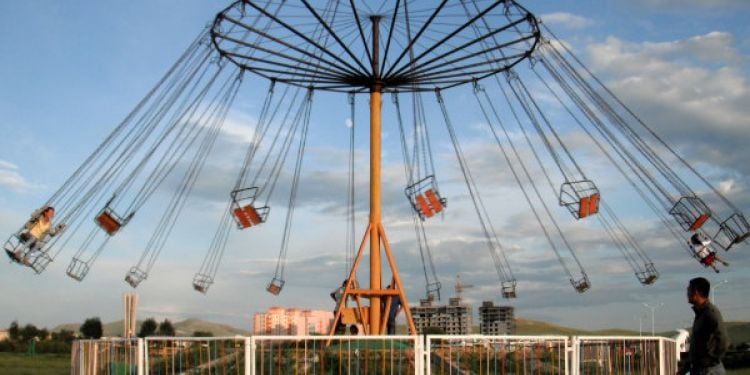Why did you choose to expatriate to Mongolia ?
I moved here from Los Angeles because I fell in love with Mongolia on a vacation in 2010, and then I returned in 2011 and fell in love with a Mongolian man. We got married in 2012. So far, both Mongolia and my husband have made me very happy with my decision.
What were the procedures to follow for a US national to move there?
I first entered the country on a tourist visa, then applied for residency with a spousal visa. U.S. citizens are allowed for 90 days in the country without a visa, which allows for time to make other visa arrangements with employers.
How long have you been in the country?
I've been here for three years now. My husband and I have a daughter. His family is a really large one, so we have a huge extended family with all of his cousins, and the family is very close. They accepted me right away and have become a big part of my life here.

What has attracted you to Darkhan?
I originally thought we'd be settling in Ulaanbaatar, but we had an apartment in Darkhan while I got settled in. I loved it right away. It has nearly all of the conveniences of UB, minus the traffic, air pollution and overcrowding. Living expenses and services are also lower here. Unfortunately, so are salaries, but if you aren't coming to Mongolia to strike it rich, Darkhan is a lovely place to be. It is Mongolia's third largest city, surrounded by beautiful hills and steppe. It's still a very rural place. Cows and horses walk the streets as they find their way back home in the afternoon. The pace here is slow and steady and it's hard to go anywhere without seeing a familiar face.
Are you currently working? What are the local labor market's features?
I was able to find an English teaching job in a private school less than a week after I moved here. I've been steadily employed ever since, but I'm no longer teaching. I came prepared with a TEFL certification that I got online. Not all schools here require certification, a college degree, or prior teaching experience for English language instruction, but they probably should, and the better schools do.
I am now working as the editor of the country's first independent English language newspaper, editor for the English language version of an online newspaper, as a freelance editor for a number of clients in UB, and as a freelance writer. I came to Mongolia with prior experience in publishing and work as a writer, but I didn't actually anticipate taking it up here. It's been fantastic.
There are a million opportunities here for people with all kinds of skills and backgrounds to find employment or start their own businesses. The challenge can be the language barrier and connecting with reliable companies, partners, and clients. Mongolia is also experiencing an economic downturn right now and there's a high unemployment rate. Competition is tight in a lot of fields.

Was it difficult to find accommodation there? What are the types of accommodation which are available?
Most typical is apartments, but developers are also building townhouses and single-family residences. There are lots of online resources for finding available housing in a pretty wide range of sizes and prices. Rental agreements can vary from month to month or by year.
How do you find the Mongolian lifestyle?
Generally speaking, it's laid back, open and warm. The hardest thing to adjust to is the sense and importance of time. Mongolians are more concerned about getting a thing done than getting it done on time. Friends and family are rarely ever "on time" but things still happen. In business, it can be a challenge to get quick and thorough responses. Priorities are managed differently. I've become a lot more "Mongolian" in my priorities, which has been much more emotionally healthy than my LA way of life. I spend a lot less time worrying about making every minute count and more about making every moment count.
Have you been able to adapt yourself to the country and to its society?
I think it's been much easier for me being married to a Mongolian. There are still things that catch me off guard, but I've become accustomed to cultural norms. The wealth gap is hard to ignore here, but in Darkhan it's not quite as bad as in UB. It's easy to ignore it if you live in an expat bubble in UB. It's easy to get involved in efforts by NGOs to bring much needed services to communities that have been left behind in the country's economic development.
What does your everyday life look like in Darkhan?
Mostly uneventful day to day things, like taking my daughter to daycare, going shopping in the markets, enjoying the public parks, having family members over for dinner, and frequent visits to our family in the countryside throughout the year at their winter, summer and spring camps. Our extended family raises sheep, goats, cows and horses. We finished building our own house last year, which was quite an experience, but happily settled into it now and working on plans for a small greenhouse.

What has surprised you the most at your arrival?
For me, it was the warm welcome by my in-laws. Staying connected to family is really important in Mongolian culture, and I think that the distance I put between me and my family made my in-laws even more eager to welcome me into theirs. When they met my parents, they assured them that they would care for me like their daughter/sister and they truly have.
Any particular experience you would like to share with us?
My most challenging experiences here have been at the public hospital. I experienced two pregnancies here - one very good one and one very tragic - both at the same maternity hospital. I'm not sure that the outcome of my second pregnancy would have been different in the States, but I would have been better informed and been able to communicate with my doctors more effectively. If you are ever in a position requiring serious medical attention, I would recommend going to one of the private hospitals in UB that has English speaking doctors and partnerships with overseas hospitals. There are many services available here, but not through the public healthcare system.
What is your opinion on the cost of living in Darkhan?
The cost of living is very low here. You can rent a two-bedroom apartment for 300,000 MNT a month, a month's worth of groceries for our family is less than 400,000 MNT, and other essentials come cheap. The issue is salary. It's hard to get the "foreigner's" salary you can get in UB. An average salary for a family that isn't struggling is 600,000 MNT to 800,000 MNT a month.
Is it easy for an expat to live there?
If you keep life simple, that works out just fine, but if you want extra pocket money, it becomes a stretch. I'm lucky to have opportunities to do work from home, but it does keep me from getting out and about more in the community. I sometimes miss the connections I had while teaching, but I met a lot of people from my work at several schools and language training centers and built some great relationships which have continued. It's always fun to see my students around town as well.
How do you spend your leisure time?

Our favorite thing to do is visit our family in the countryside. It always means a little bit of work too though, helping out. In summer, there are lots of outdoor events and evenings in the park. We love to travel around the country when we can, our favorite trip being up North to Lake Khuvsgul. We also head in to UB a few times a month to get together with mostly expat friends.
Your favorite dishes?
My favorite Mongolian dish is tsuivan. It's hand-cut wheat noodles with meat, potatoes, carrots, but you can add other veggies. Second favorite is khuushuur, a deep fried pocket of meat.
What are the differences between life in the US and in Mongolia?
There are too many to name, but the most notable difference is priorities. I spend less time worrying about things that can be draining and more time enjoying the little things that make life rich.
Do you miss your home country?
I mostly miss my family and friends. There are conveniences that I look back on as being taken for granted, but learning ways around them - becoming more resourceful - has been one of the pleasures of living here.
Would like to give any advice to soon-to-be expatriates?
Put all expectations aside and be open to new ways of problem solving. It will make life here a lot easier.
What are your plans for the future?
We are planning to save more for travels. I plan to do more writing in 2015, and to get our garden going so we can have a better variety of vegetables on hand. Nothing glamorous. Next summer, we plan to do a trip to the Gobi since I've never seen that part of the country, and the following year we'll head west to Bayan Ulgii to try to catch a glimpse of eagle hunters.











Contact us to be featured in the Interviews section.
Participate